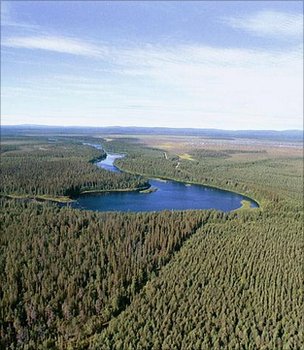European forests near 'carbon saturation point'
European forests are showing signs of reaching a saturation point as carbon sinks, a study has suggested. Since 2005, the amount of atmospheric CO2 absorbed by the continent's trees has been slowing. This was a result of a declining volume of trees, deforestation and the impact of natural disturbances.
Carbon sinks play a key role in the global carbon cycle and are promoted as a way to offset rising emissions. The carbon cycle is the process by which carbon - essential for life on the planet - is transferred between land (geosphere and terrestrial biosphere), sea (hydrosphere) and the atmosphere. Carbon sinks refers to the capacity of key components in the cycle - such as the soil, oceans, rock and fossil fuels - to store carbon, preventing it from being recycled, eg between the land and the atmosphere. Many of Europe's forests are reaching an age where growth, and carbon uptake, slows down.
The continent's forests had been recovering in recent times after centuries of stock decline and deforestation. The growth had also provided a "persistent carbon sink", which was projected to continue for decades.
However, the team's study observed three warnings that the carbon sink provided by Europe's tree stands was nearing a saturation point.
First, the stem volume increment rate (of individual trees) is increasing and thus the sink is curbing after decades of increase. Second, land use is intensifying, thereby leading to deforestation and associated carbon losses. Third, natural disturbances (like wildfires) are increasing and, as a consequence, so are the emissions of CO2.

No comments:
Post a Comment